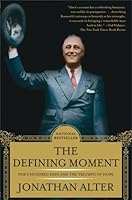 Cover via AmazonJonathan Alter, who has been on Countdown and Rachel Maddow Show often as well as on many progressive radio shows, wrote a book called "The Defining Moment: Franklin Roosevelt and the First Hundred Days". It's been said that Obama read the book several times and was very impressed, and he has used the phrase "This Is The Defining Moment" several times.
Cover via AmazonJonathan Alter, who has been on Countdown and Rachel Maddow Show often as well as on many progressive radio shows, wrote a book called "The Defining Moment: Franklin Roosevelt and the First Hundred Days". It's been said that Obama read the book several times and was very impressed, and he has used the phrase "This Is The Defining Moment" several times.This is something I've wanted to see, that Obama realized that we are in a situation eerily similar to when FDR entered the presidency in 1932. It's important because FDR gave us 50 years of prosperity and a large middle class for the very first time. It only started falling apart when Reagan came into office and started dismantling all of it, which has led us directly to where we are now.
My favorite economist Paul Krugman wrote a long article on this called "What Obama Must Do" and brought up what FDR did.
 Image by Getty Images via DaylifeBut he had more detail:
Image by Getty Images via DaylifeBut he had more detail:The last president to face a similar mess was Franklin Delano Roosevelt, and you can learn a lot from his example. That doesn't mean, however, that you should do everything FDR did. On the contrary, you have to take care to emulate his successes, but avoid repeating his mistakes.He then goes on to say that creating universal health care would be his biggest legacy:
Back in 1993, when the Clintons tried and failed to create a universal health care system, Republican strategists like William Kristol (now my colleague at The New York Times) urged their party to oppose any reform on political grounds; they argued that a successful health care program, by conveying the message that government can actually serve the public interest, would fundamentally shift American politics in a progressive direction. They were right — and the same considerations that made conservatives so opposed to health care reform should make you determined to make it happen.Think for a moment about what Kristol said - they should oppose health care not because it is bad for America but because it is good for America. It would destroy their myth of government always bad and turn us in a proghressive path. He was perfectlyt willing to let people die due to lack of health care in order to advance the Republican political agenda. This is why I call Republicans evil.
Universal health care, then, should be your biggest priority after rescuing the economy. Providing coverage for all Americans can be for your administration what Social Security was for the New Deal. But the New Deal achieved something else: It made America a middle-class society. Under FDR, America went through what labor historians call the Great Compression, a dramatic rise in wages for ordinary workers that greatly reduced income inequality. Before the Great Compression, America was a society of rich and poor; afterward it was a society in which most people, rightly, considered themselves middle class. It may be hard to match that achievement today, but you can, at least, move the country in the right direction.
What caused the Great Compression? That's a complicated story, but one important factor was the rise of organized labor: Union membership tripled between 1935 and 1945. Unions not only negotiated better wages for their own members, they also enhanced the bargaining power of workers throughout the economy. At the time, conservatives warned that wage gains would have disastrous economic effects — that the rise of unions would cripple employment and economic growth. But in fact, the Great Compression was followed by the great postwar boom, which doubled American living standards over the course of a generation.
So we need health care and robust unions, the very things Republicans fight tooth and nail to stop. I very much recommend reading all of Krugman's article. It is long but easy to read and chock full of details. You will understand just how bad off we really are right now and what needs to be done to fix it.
![Reblog this post [with Zemanta]](http://img.zemanta.com/reblog_a.png?x-id=bb8d73c3-3e39-46a7-acb3-3fb2dd6aaee2)
No comments:
Post a Comment